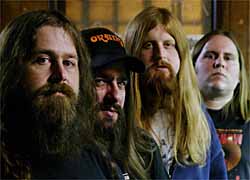Devil to Pay seeks the hard-rock faithful
by David Lindquist
 Devil to Pay is (from left) Rob Secrist, guitar; Steve Janiak, vocals/guitar; Matt Stokes, bass; and Chad Prifogle, drums. The quartet got past Janiak's serious illness to emerge on top of the Battle heap. -- Mpozi Mshale Tolbert / The Star |
Devil to Pay is the kind of band that Jack Black would love.
Making socks rock and faces melt comes naturally for the hirsute quartet of Indianapolis musicians. And surely Black, lord of Tenacious D and "School of Rock," would admire Devil to Pay's showing at this summer's Battle of the Bands series.
After the smoke cleared at the Vogue on Aug. 21, Devil to Pay stood high above the mucky-muck -- ultimate champions in a six-month, 100-band competition.
Steve Janiak, the band's vocalist-guitarist and former frontman of popular Indiana bands Neurotic Box and Publiminal Sigs, also has an appreciation of mischief and grandeur in common with Black.
"I talk too much," Janiak says. "I try to be funny when it's not time to be funny. I don't stop."
Devil to Pay, however, is no novelty act.
The band plays heavy metal that's glacial and hypnotic one moment and whiplash-quick a moment later. Epic guitar groups such as Black Sabbath, Monster Magnet and Queens of the Stone Age paved the way.
"It's all about the riff," explains Devil to Pay guitarist Rob Secrist.
And a good riff is defined as what?
"Something that you can grab ahold of and bob your head to," he says. "If you can do that, it's a good riff."
Devil to Pay's concert fliers and Web site are populated by Beelzebub horns and vixens sporting tails, but the underworld imagery shouldn't scare anyone off.
Adjectives such as "stylish" and "tongue-in-cheek" fit the band. "Sinister" does not.
Nevertheless, laughs were hard to come by earlier this year, when Janiak was hospitalized for more than a month after blood clots threatened his internal organs. Even today, he wears a brace that serves as a makeshift abdominal wall.
The minor miracle, he says, wasn't that Devil to Pay won the Battle of the Bands. It's that the group participated at all.
"Anybody can beat anybody in the Battle," Janiak says. "It depends on when you play and who comes out. I don't think winning the Battle was our expectation whatsoever. I got to play two weeks after getting a skin graft. That was a big deal."
Conflict of interest?
Minor controversy followed the Battle of the Bands finale, because Janiak works as a graphic designer for the contest's primary sponsor, Benchmark Records. The company worked to insure an impartial outcome by leaving the vote to audience ballots and a panel of independent judges. What Benchmark didn't do is ban its employees from entering the competition.
Anyway, momentum from the Battle victory helped Devil to Pay prepare its debut album in a matter of weeks.
The band has scheduled a pair of shows Saturday to celebrate the release of "Thirty Pieces of Silver." The recording will be sold at the Melody Inn and Emerson Theater appearances, and then be available in area stores on Dec. 16.
Meanwhile, Devil to Pay plans to spread its gospel of riffs on a seven-date tour during the first half of December. The excursion will hit hotbeds of heavy music ranging from Louisiana to Arizona.
"Maybe the reason we do better than some of the other bands I've been in is that Devil to Pay starts with what we're into personally," Janiak says.
Rather than trying to craft hits for modern-rock radio, Janiak, Secrist, bass player Matt Stokes and drummer Chad Prifogle initially took their cues from a national underground scene of "stoner" and "doom" styles. The former is known for mind-bending instrumental passages, while the latter is characterized by slow, sludgy arrangements.
"Before this, a band hadn't really sparked my interest in 10 to 12 years," Stokes says.
Up from underground
The underground may have triggered Devil to Pay's formation, but the foursome may quickly outgrow cult status. Thanks to an abundance of melodic hooks, both headbangers and nonheadbangers can groove to songs such as "Tractor (Expletive) Trailer" and "Toreador."
"Most of the 'stoner' rock bands I've heard -- the bands are awesome, but they don't have a singer who can sing," Prifogle says. "That's their downfall."
Devil to Pay recorded "Thirty Pieces" at Azmyth Recording Studio in Carmel. Janiak credits producer Ryan Adkins for insisting on multiple vocal takes to achieve a roughed-up sound.
"I'm a lot happier with this than some other stuff I've done," Janiak says. "Some of it has been too clean. You put an edge to something and it has more life."